Decision Spread
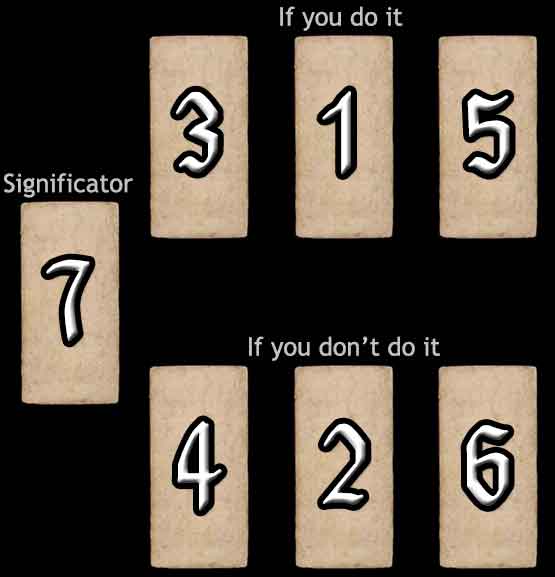
Difficulty: Easy
This simple but highly useful spread calls for a question to be asked in this format:
'What happens if I do (X), and what happens if I do not do (X)?'
Please note that it should not be viewed as a decision between two different options, but about whether a single option should be exercised or not. A second option would call for a separate reading.
Card #7 is the significator, the overall theme of the query.
Cards #3, #1, & #5 represent the chronological sequence of events that occurs if the reader chooses to do (X).
Cards #4, #2, & #6 represent the chronological sequence of events that unfolds if the reader chooses not to do (X).
Your Decision Reading
The Significator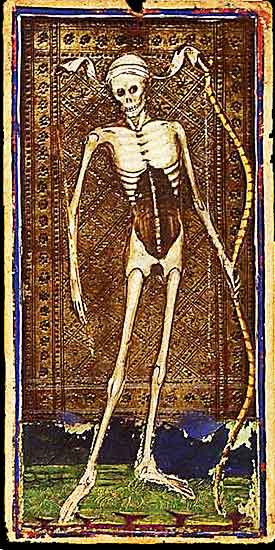 XIII – Death |
Outcome if you do it: | ||
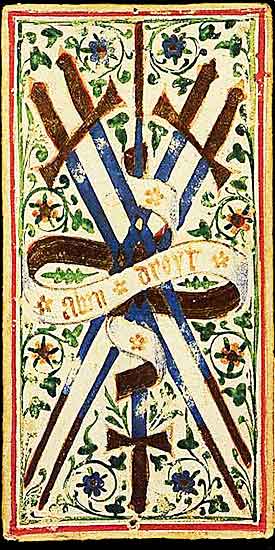 Five of Swords |
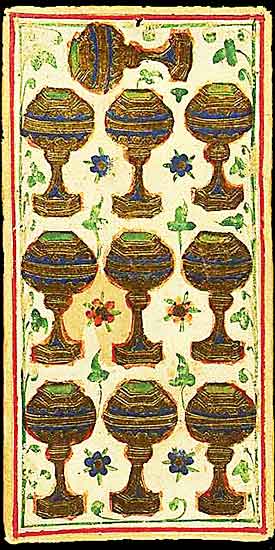 Ten of Cups |
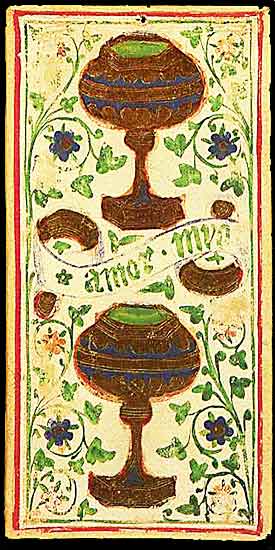 Two of Cups |
|
| Outcome if you don't do it: | |||
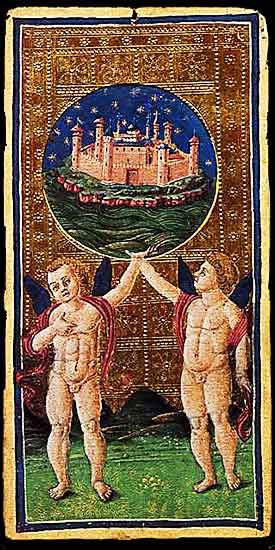 XXI – The World |
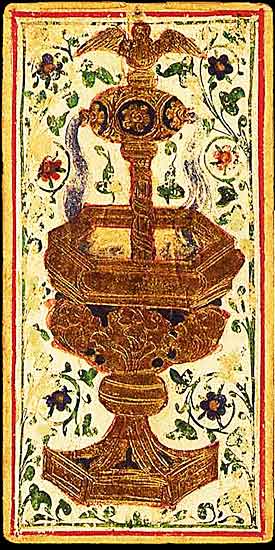 Ace of Cups |
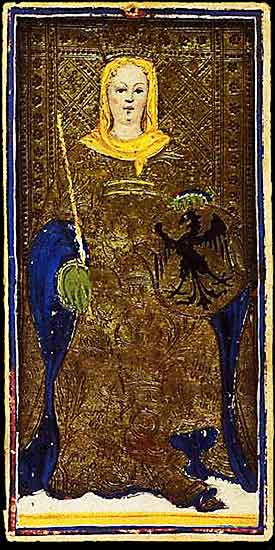 III – The Empress |
|

XIII – Death
Death signifies the inevitable conclusion of one cycle and the heralding of another. It's a powerful symbol of transformation, renewal, and the necessity of endings to foster new beginnings.
Symbolism: The skeletal figure with a scythe represents the impartial and unrelenting nature of time and change. The image of fallen bodies suggests the end of a phase, but the subtle floral designs interwoven with the scene offer hope, symbolising rebirth and the cyclical nature of existence. The golden background emphasises the universal truth of transformation and the inevitability of all life cycles.
In Relationships: This card suggests the end of an old emotional pattern or relationship, clearing the way for renewal. Let go of what no longer serves you to make space for new, healthier connections.
In Work: Death marks the close of one professional chapter. It's a time for endings, making way for new opportunities and growth. Embrace the transition instead of fearing it.
Spiritually: Death calls for a transformation, letting go of old beliefs or attachments. Spiritual rebirth requires an embrace of the unknown and a surrender to the cycles of existence.
When ill-dignified: Resistance to change, stagnation, and fear of letting go. This can manifest as clinging to the past or an inability to move forward, hindering growth.
Outcome if you do it:

Five of Swords
The Five of Swords represents conflict, competition, and mental struggle. It suggests a situation where victory may come at a cost, with tension and discord present. This card can indicate a win achieved through manipulation, dishonesty, or at the expense of others.
Symbolism: The swords are arranged in an unbalanced formation of four-on-one, highlighting the disharmony and imbalance created by conflict. The uneven positioning of the blades reflects the instability caused by mental or emotional discord, while their fine craftsmanship hints at the complexity of the situation.
In Relationships: Conflict or mental challenges. The Five of Swords suggests that a fight or disagreement may have left scars, and one must decide whether to continue fighting or walk away.
In Work: A competitive or combative environment. This card warns that achieving success at the expense of others may lead to resentment or long-term harm.
Spiritually: Mental conflict or inner turmoil that disrupts your peace of mind. The Five of Swords advises resolving spiritual disputes and finding reconciliation within yourself.
When ill-dignified: Deception, defeat, or unnecessary conflict. The Five of Swords warns against manipulative behaviour or unnecessary mental battles that lead to no real resolution.

Ten of Cups
The Ten of Cups represents emotional completion, harmony, and fulfilment. It signifies a time of lasting happiness, contentment, and the realisation of emotional dreams. This card speaks to family, love, and the joy of emotional unity.
Symbolism: The ten chalices arranged in two rows of five suggest a perfect balance and alignment of emotional forces. The detailed decoration of the cups emphasises the richness of emotional life and the culmination of desires fulfilled.
In Relationships: The achievement of emotional harmony and fulfilment in your relationships. The Ten of Cups signals lasting love, happiness, and emotional contentment.
In Work: A sense of emotional fulfilment in your professional life, especially in work that aligns with your values and passions.
Spiritually: Complete emotional and spiritual harmony. This card invites you to embrace the fulfilment of your soul's desires and live in emotional balance.
When ill-dignified: Emotional discontent, disharmony, over-indulgence, or a sense that things are not as perfect as they appear. The Ten of Cups warns against taking happiness for granted.

Two of Cups
The Two of Cups represents mutual love, partnership, and emotional harmony. It reflects the balance between two individuals, suggesting that both partners offer their hearts equally. This card symbolises the harmonious exchange of energy and emotional support.
Symbolism: The two chalices, positioned one above the other, reflect equality and mutual respect. The designs on the cups show that while there are differences, they complement each other perfectly. The symmetrical arrangement emphasises the theme of balance and unity in relationships.
In Relationships: Deep connection and mutual understanding with a partner. The Two of Cups signals emotional balance and union, whether in a romantic partnership or a close friendship.
In Work: A strong, supportive collaboration or partnership that brings emotional fulfilment and success. This could represent a productive relationship where both parties work in harmony.
Spiritually: Union with a higher power or deeper connection to the divine. This card suggests emotional balance and spiritual partnership.
When ill-dignified: Disharmony, imbalanced relationships, or emotional disconnection. The Two of Cups can warn of emotional misunderstandings or an unbalanced partnership.
Outcome if you do not do it:

XXI – The World
The World represents completion, wholeness, and the harmonious integration of all aspects of life. It is the last card of the Major Arcana, signalling the end of one journey and the beginning of another.
Symbolism: The two ethereal figures holding the globe or portal represent the union of duality and the achievement of balance. The rolling plains and distant mountains beneath the golden sky symbolise the vast potential of the world, and the figures' gesture of offering suggests a celebration of accomplishment. The card evokes cosmic harmony, completion, and the endless cycles of existence.
In Relationships: The World signifies a complete and fulfilling relationship, one where both partners are in harmony and balanced with each other. It's a time of celebration and unity.
In Work: Completion of a major goal or project. The World indicates the successful culmination of efforts, with new horizons opening up in your professional life.
Spiritually: A time of wholeness. The World signifies a sense of fulfilment and oneness with the universe, representing the final stage of spiritual evolution.
When ill-dignified: Incompletion, being stuck, or an inability to move forward. This card warns of a lack of closure or an unfinished journey that hinders your growth.

Ace of Cups
The Ace of Cups signifies the birth of emotions, spiritual renewal, and the flow of abundance. It represents the opening of the heart, the initiation of emotional healing, and the potential for deep, transformative love. This card invites you to embrace your emotions with openness and trust, knowing that your emotional reservoir is being replenished.
Symbolism: The ornate chalice symbolises emotional receptivity and divine blessing. The stream of water flowing from its rim represents the endless flow of love and creativity, while the simple background emphasises the purity of this new emotional beginning. The card evokes feelings of peace, connection, and the potential for emotional fulfilment.
In Relationships: The beginning of a new, emotionally fulfilling relationship or a deepening of connection with someone already in your life. This is a time of emotional renewal and openness.
In Work: The birth of new opportunities that align with your passions and creativity. It signals a time to trust your intuition and pursue work that brings you joy.
Spiritually: A call to open your heart and embrace spiritual growth. The Ace of Cups encourages you to explore your inner world and find healing and emotional wholeness.
When ill-dignified: Emotional blockages, closed off from new experiences, or difficulty trusting emotions. This suggests there is a resistance to embracing emotional flow.

III – The Empress
The Empress symbolises abundance, creativity, and nurturing energy. She represents the generative force of nature and the ability to create and sustain growth, both literally and figuratively.
Symbolism: The Empress's sceptre and crown symbolise her authority, while her shield connects her to the Visconti family lineage. The floral embroidery on her gown reflects her connection to nature and fertility. The golden background underscores her divine and regal status.
In Relationships: A time of emotional abundance and nurturing. The Empress signals love, harmony, and growth.
In Work: Creative projects flourish under the Empress's guidance. She encourages nurturing ideas and building strong foundations.
Spiritually: The Empress represents the divine feminine, inviting the seeker to embrace growth and connect with nature's rhythms.
When ill-dignified: Stagnation, overindulgence, or a smothering presence in relationships.